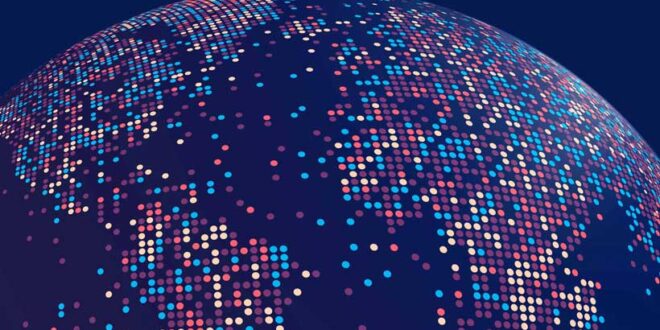Athar Ali
The Cobweb Model of Complex Interdependence constituting globalization is intricate and encompasses the entire international arena. As a result of the complex network of digital connections and global cooperation, business, information sharing, and multilateral diplomacy have undergone revolutionary shifts. Even while trade, travel, and technology communicated links between economies, communities, and individuals and thus promoted Global Citizenship, the future of globalization is yet uncertain. The adaptability and resilience of globalization are evident in the face of regionalism, identity politics, and the global COVID-19 pandemic virus.
From the digital revolution’s facilitation of international trade to the global coordination of emergency responses, globalization still impacts our globe. This article analyzes globalization’s consequences and offers suggestions for making it productive in building a sustainable future for the world.
E-commerce and digital communication have facilitated globalization by linking consumers, markets, and sellers worldwide. Doing business beyond borders has been eased by the proliferation of tech-savvy online marketplaces and shopping sites. Technology advancements, as seen by the progress of the Chinese e-commerce giant Alibaba, have revolutionized global trade. Since its establishment in 1999, Alibaba has dispensed numerous platforms (including Alibaba.com and AliExpress) that facilitate communication and commerce on a global scale. Chinese and other businesses worldwide have benefited from Alibaba’s online market, secure payment options, and logistical services. Alibaba’s continued contribution towards reducing barriers to international trade and highlighting the significance of globalization.
Then, globalization has made it easier for individuals from other states to collaborate, which has resulted in significant breakthroughs. Cooperation and collaboration communication between scientists, researchers, and institutions globally has increased productivity and facilitated the exchange of information and expertise. The COVID-19 pandemic proved once and for all the value of global cooperation in pursuing scientific progress. The rapid development of highly efficient vaccinations is primarily due to international collaboration between numerous pharmaceutical corporations and academic organizations. Pfizer and BioNTech created the COVID-19 vaccine, a prime instance of the aforementioned scenario. American pharmaceutical behemoth Pfizer and German biotech firm BioNTech developed and marketed the vaccine. This international endeavor proved the merits of globalization by demonstrating the effectiveness of international cooperation in the face of catastrophe.
Many companies adopting Artificial Intelligence attest to the globe being a smaller place. As AI develops and becomes more accessible, businesses and industries use AI solutions to boost productivity, cut costs, and differentiate themselves from the competition. The application of AI in medicine perfectly illustrates the concept in action. Medical and research institutions use AI to enhance clinical decision-making, patient care, and health outcomes. For instance, by analyzing medical photos for telltale indicators of sickness using surgery-assisting robots, AI systems can aid clinicians in making more informed decisions. AI makes automation, predictive analytics, and optimization possible, allowing businesses like banking, manufacturing, and agriculture to enhance output and efficiency. This widespread adoption of AI solutions exemplifies how globalization has opened up new opportunities for innovative approaches to old business challenges.
Issues like climate change require global collaboration for a successful resolution. Globalization has allowed governments towards joint action through treaties to address pressing environmental issues. The Kigali Amendment was introduced to the international agreement known as the Montreal Protocol in 2016. Its objective stands to protect the ozone layer. Hydrofluorocarbons are greenhouse gases commonly used in air conditioners and refrigeration. This adjustment will result in reduced demand for them. The Kigali Amendment exemplifies the power of globalization to bring governments together to address a pressing international issue.
Globalization was once aided by individuals sharing information and cooperation beyond boundaries, but now it needs help with several challenges. Some examples are the divisiveness sown by triumphalism and identity politics, the growth of nationalism at the regional level, and the havoc wreaked by the COVID-19 pandemic. International trade and intellectual interchange are in jeopardy due to the emergence of regionalism, which prioritizes national or regional interests over those of international collaboration. The epidemic’s disruption of global supply lines and travel highlighted the peril of globally interconnected nations. This sparked demands for autonomy and protectionist measures. The emergence of triumphalism and identity politics, fueled by nationalist aspirations and cultural differences, also challenges international collaboration and hyper-globalization. In today’s increasingly globalized world, success requires balancing and staying true to oneself and helping others from other backgrounds and cultures.
Several approaches might be considered to increase globalization’s legitimacy and sustainability. The creation of regulatory frameworks that balance the benefits of global interconnection and safeguards against exploitative practices, such as those that ensure respectable working conditions, environmental sustainability, and individual privacy, must be prioritized by nations and international organizations. Second, investing in digital infrastructure and literacy, especially in underprivileged areas, can ensure that digital communication and e-commerce advantages are accessible to a broader audience. Third, to counteract the divisive impacts of identity politics, support for cross-cultural education and opposing viewpoints can help to develop a more inclusive global society. Increased international collaboration in research and development can lead to creative approaches for resolving global issues, as seen by the rapid manufacture of vaccinations during the outbreak. Finally, the Kigali Amendment demonstrates that coordinated efforts may address significant international problems. It does this by bolstering global agreements to address climate change. If these ideas are implemented, globalization can become a powerful force for good that benefits more individuals and significantly impacts the world.
“Despite challenges, globalization continued to reveal its significance by influencing trade, cooperation, and knowledge sharing.” The web continues to evolve, which affects trade deals, foreign cooperation, and the free flow of ideas. Globalization remains resilient, evidenced by online marketplaces and combined efforts to fight the pandemic. By focusing on these things now, we can contribute to the critical parts of globalization, like global ethics, growth, comprehension, and unity, in the future.
 Geostrategic Media Political Commentary, Analysis, Security, Defense
Geostrategic Media Political Commentary, Analysis, Security, Defense





